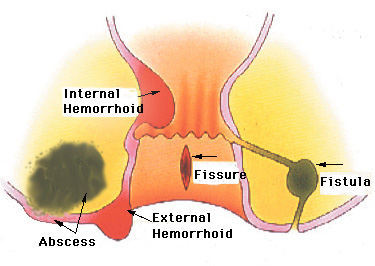
|
|
An external hemorrhoid is a swollen blood vessel (vein) which underlies the skin around the anus. Occasionally, they can become suddenly painful when they develop a clot (Thrombosed Hemorrhoid). This pain does not persist for more than few days before being relieved. |
|
|
Internal hemorrhoids are abnormal large vessels (veins) that are located under the lining of the rectum and they swell up with any straining. They are commonly enlarged to the point that they protrude out of the rectum and may have to be pushed back in after any straining (such as a bowelmovement). |
|
|
The classical symptoms are those of pain and bleeding with a bowel movement. This pain may persist for many hours after a bowel movement. The fissure is caused by a tear in the lining of the anal skin. |
|
|
It is an abnormal, thin tunnel that connects the inside of the rectum with the outside through a small hole that is located to the side of the rectum. A fistula will usually leak blood-stained pus (cloudy fluid), because, as mentioned, it is a form of mild infection. There usually is some discomfort, but this condition isn't really painful. |
|
|
The perirectal abscess (or boil) is a cause of sudden (acute) pain and usually also causes swelling. It is caused by an infection of small glands located around the rectum (perianal glands). The pain and swelling will continue until the boil. |
|
|
There are many other anorectal diseases like Polyp , Proctitis, Levator Muscle Spasm , Genital Herpes ,Cancer . Pilonidal Abscess ,Skin Tag ,Polyp ,Rectal Prolapse, Anal Warts (Condyloma) ,etc. ( See "classification of Hemmorhoids and anorectal disease".) |